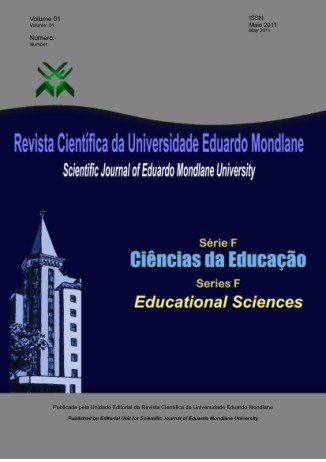INVESTIGANDO O IMPACTO DOS RITOS DE INICIAÇÃO NO ACESSO À EDUCAÇÃO E FORMAÇÃO DE CRIANÇAS E ADOLESCENTES: O CASO DA ALTA ZAMBÉZIA
Resumo
Este artigo resulta de um estudo realizado com o objectivo de investigar o impacto dos ritos de iniciação no acesso à educação e formação de crianças e adolescentes, particularmente da rapariga. Especificamente, o estudo visava identificar os ensinamentos dos ritos de iniciação, o modo como estes são abordados e verificar a sua influência no acesso e continuidade da rapariga na escola. O estudo decorreu em cinco distritos da Província da Zambézia, nomeadamente, Alto Molócuè, Guruè, Gilé, Ile e Namarrói. Em cada distrito foi seleccionada uma localidade por conveniência. Sendo um estudo etnográfico, foram administradas entrevistas qualitativas com os informantes chave e aplicado um guião de observação. Os resultados do estudo sugerem não haver influência directa dos ritos de iniciação no acesso à educação por parte de rapazes e raparigas, ainda que persistam alguns problemas relativamente à frequência e retenção de alunos na escola. O estudo recomenda que se melhore a coordenação entre as autoridades da educação e as autoridades locais para reverter o cenário caracterizado pela baixa assiduidade e abandono escolar dos alunos.
Referências
BROWN, J. K. A cross-cultural study of female initiation rites. American Anthropologist. v. 65, p. 837-853, 1963.
CHERKAOUI, M. Sociologia da educação. 2. ed. Sintra: Europa-América, 1986.
CIPIRE, F. A educação tradicional em Moçambique. Maputo: EMEDIL, 1996.
COHEN, L.; MANION, L.; MORRISON, K. Research methods in education. London: Routledge Falmer, 2000.
COSSA, E.; HOLTMAN, L.; OGUNNIYI, M. and MIKALSEN, Ø. Assessing students’ understanding of cell division in an undergraduate biology course: a qualitative perspective. African Journal of Research in Mathematics, Science and Technology Education, v. 12, n. 2, p. 17-30, 2008.
CRESWELL, J. Qualitative inquiry and research design: choosing among five traditions. Thousand Oaks: Sage , 1998.
CRESWELL, J.W. Research design: qualitative, quantitative, and mixed methods approaches. 2. ed. Thousand Oaks: Sage, 2003.
FORUM MULHER; SARDC WIDSSA. Para além das desigualdades 2005: A Mulher em Moçambique. Maputo: Autores, 2006.
GASPERINI, L. Moçambique: educação e desenvolvimento rural. Roma: Edizioni Lavoro, 1989.
HOLANDA, A. Questões sobre pesquisa qualitativa e pesquisa fenomenológica. Análise Psicológica, v. 3, n. 24, p. 363-372, 2006.
JUNOD, H. A. Usos e costumes dos bantu. Maputo: AHM, 1996.
MAIA, R. L. Dicionário de sociologia. Porto: Porto, 2002.
MARIANO, E. (De)-objectification of the body: the women’s subjectivity in the construction of sexuality and sexual health in Mozambique. European Conference on African Studies, Germany, 2009.
MEDEIROS, E. Os senhores da floresta: ritos de iniciação dos rapazes macuas e lómués. Porto: Campos das Letras, 2007.
NEUMAN, W. L. Social research methods: qualitative and quantitative approaches. 5th Ed, USA: Pearson Education, 2003.
OSÓRIO, C. Ritos de Iniciação: Um debate necessário, 2008. In Outras Vozes, nº 22. Disponível em: www.wlsa.org.mz/lib/bulletins/ OV22.pdf. Acesso em: 05 de Maio de 2014.
RANGEL, L. H. Da infância ao amadurecimento: uma reflexão sobre rituais de iniciação. Interface-Comunicação, Saúde, Educação, v. 5, p. 147-151, 1999.
RATILAL, A. B. G. M. A Sexualidade na adolescência: valores, atitudes e práticas dos adolescentes e jovens da Cidade de Maputo, 1999. (Tese de Mestrado. Universidade do Porto/Faculdade de Medicina).
RICHARDSON, R. J. Pesquisa social: Métodos e técnicas. 3ª ed. São Paulo: Atlas, 1999.

